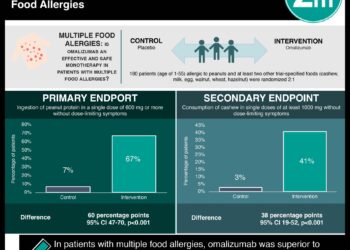Early food introduction in infant diets associated with lower risk of allergic disease
1. Early egg or peanut introduction during the first year of life was associated with lower risk of developing food allergies.
2. Early gluten introduction was not associated with increased celiac disease risk.
Evidence Rating Level: 1 (Excellent)
Study Rundown: In animal studies, a large body of evidence has demonstrated that early enteral exposure to antigens can reduce the risk of developing allergic sensitization. While this phenomenon was expected to be similar in humans, recent reports of early multiple food introduction has not appeared to prevent food allergies and other studies have found no link between gluten introduction and the development of celiac disease.
This systematic review and meta-analysis was undertaken to analyze whether timing of allergenic food introduction into infant diet influences the risk of developing allergic or autoimmune disease later in life. Early introduction of egg (from 4-6 months in the infant diet) and peanut (from 4-11 months) were associated with reduced risk of developing egg or peanut allergy. Gluten introduction was not associated with risk of celiac disease. Finally, there was lower-certainty evidence that early fish introduction was associated with reduced allergic sensitization and rhinitis.
Overall, the study showed that early introduction of certain allergenic foods in diets during the first year of life were associated with a lower risk of developing allergic disease. This evidence was limited to a small number of primary studies, and further studies are required to confirm the relationship between egg or peanut introduction and subsequent allergic disease development. The study provides important implications for current guidelines that advise against early introduction of allergenic foods.
Click to read the study in JAMA
Relevant Reading: Randomized Trial of Introduction of Allergenic Foods in Breast-Fed Infants
In-Depth [systematic review and meta-analysis]: The Cochrane Library, EMBASE, LILACS, MEDLINE, Web of Science, and other databases were searched from Jan 1, 1946 to March 8, 2016 to identify relevant intervention trials, observational studies, and other high quality systematic reviews. These studies evaluated allergenic food introduction during the first year of life and any consequent effects resulting from this later in life. Studied outcomes included wheeze, eczema, allergic rhinitis, food allergy, allergic sensitization, type 1 diabetes mellitus, celiac disease, inflammatory bowel disease, juvenile rheumatoid arthritis, psoriasis, and vitiligo.
Overall, the initial review yielded 146 eligible studies. Twenty-four interventional trials (13 298 participants) and 69 observational studies (142 103 participants) evaluated allergic outcomes. Five interventional trials (5623 participants) and 48 observational studies (63 576 participants) evaluated autoimmune diseases. Psoriasis or vitiligo were not reported in any study. Using the GRADE criteria, moderate-certainty evidence showed egg introduction at 4-6 months, and peanut introduction at 4-11 months was associated with lower risk of allergic disease development. High-certainty evidence showed gluten introduction was not associated with increased risk of Celiac disease. Low- to very low-certainty evidence showed fish introduction was associated with reduced risk of allergic sensitization and rhinitis. Further, no consistent evidence was found that early cow’s milk introduction was associated with risk of type 1 diabetes mellitus.
Image: PD
©2016 2 Minute Medicine, Inc. All rights reserved. No works may be reproduced without expressed written consent from 2 Minute Medicine, Inc. Inquire about licensing here. No article should be construed as medical advice and is not intended as such by the authors or by 2 Minute Medicine, Inc.







